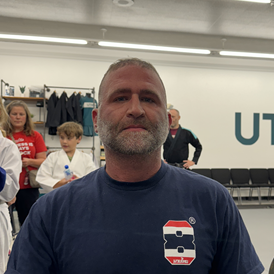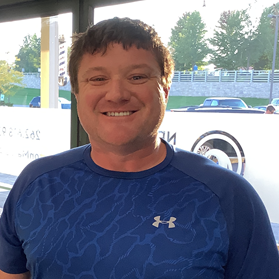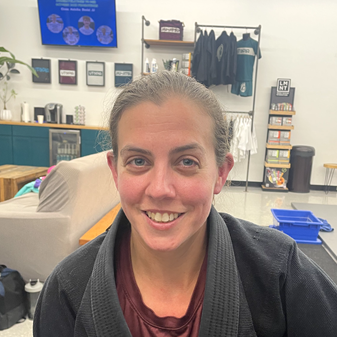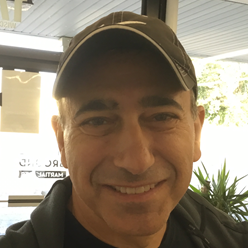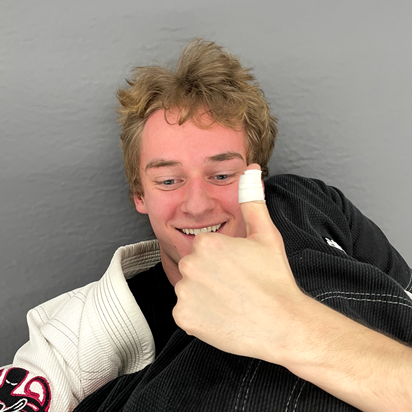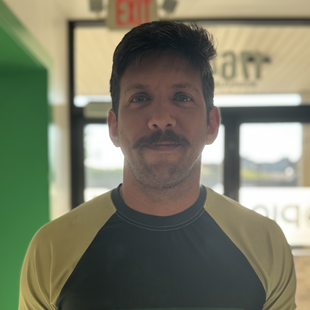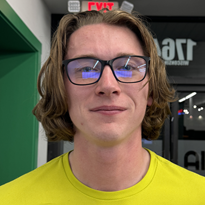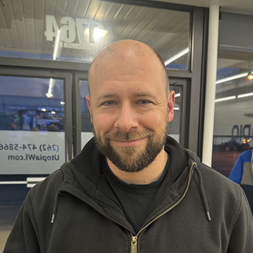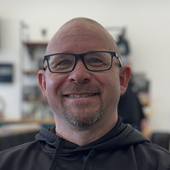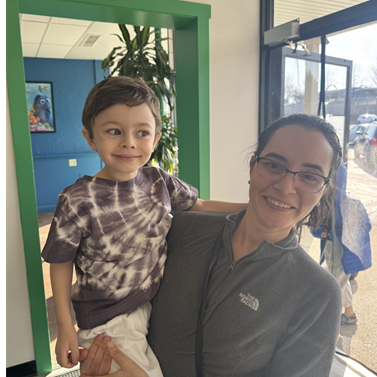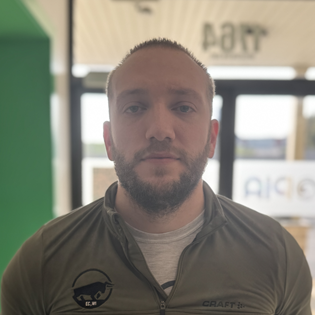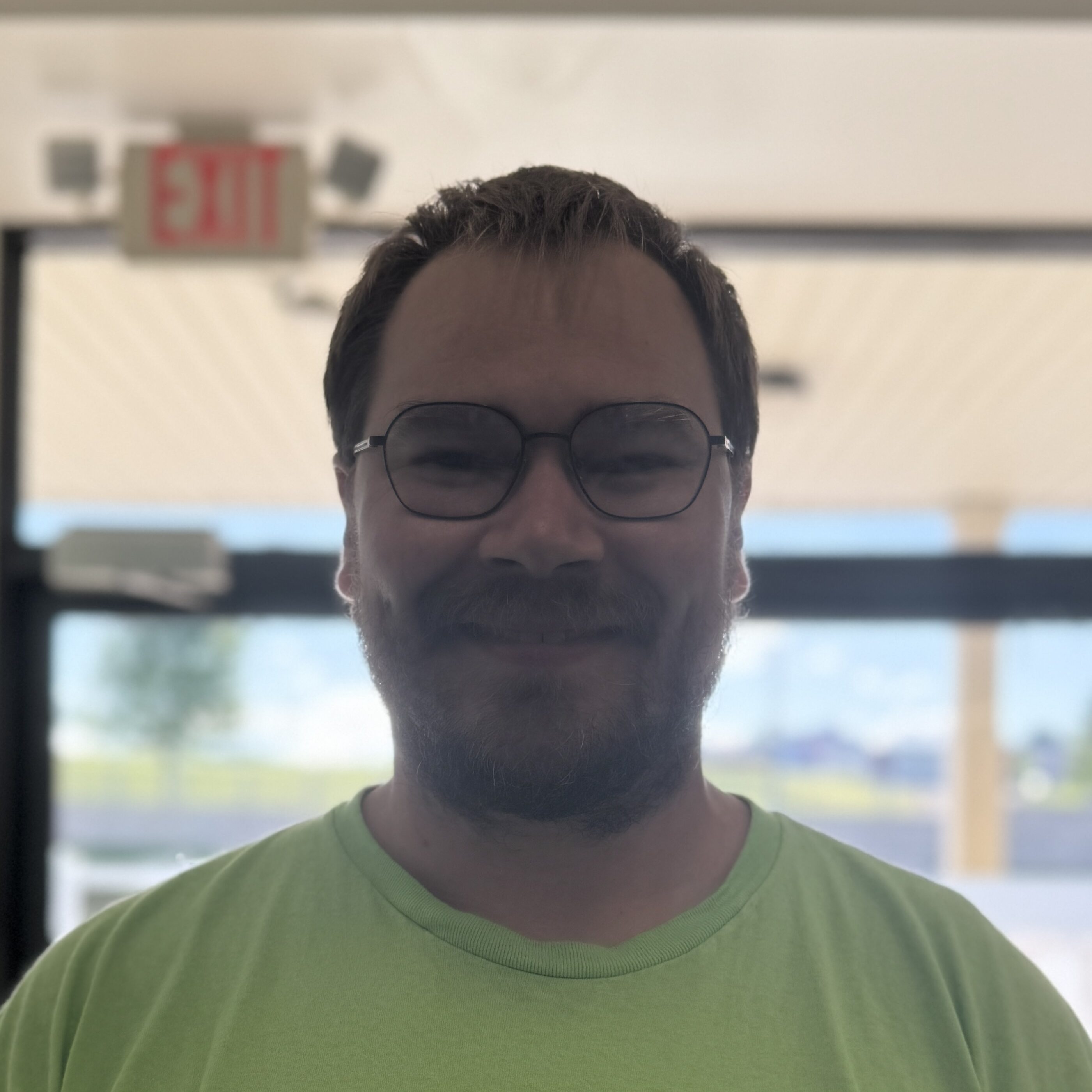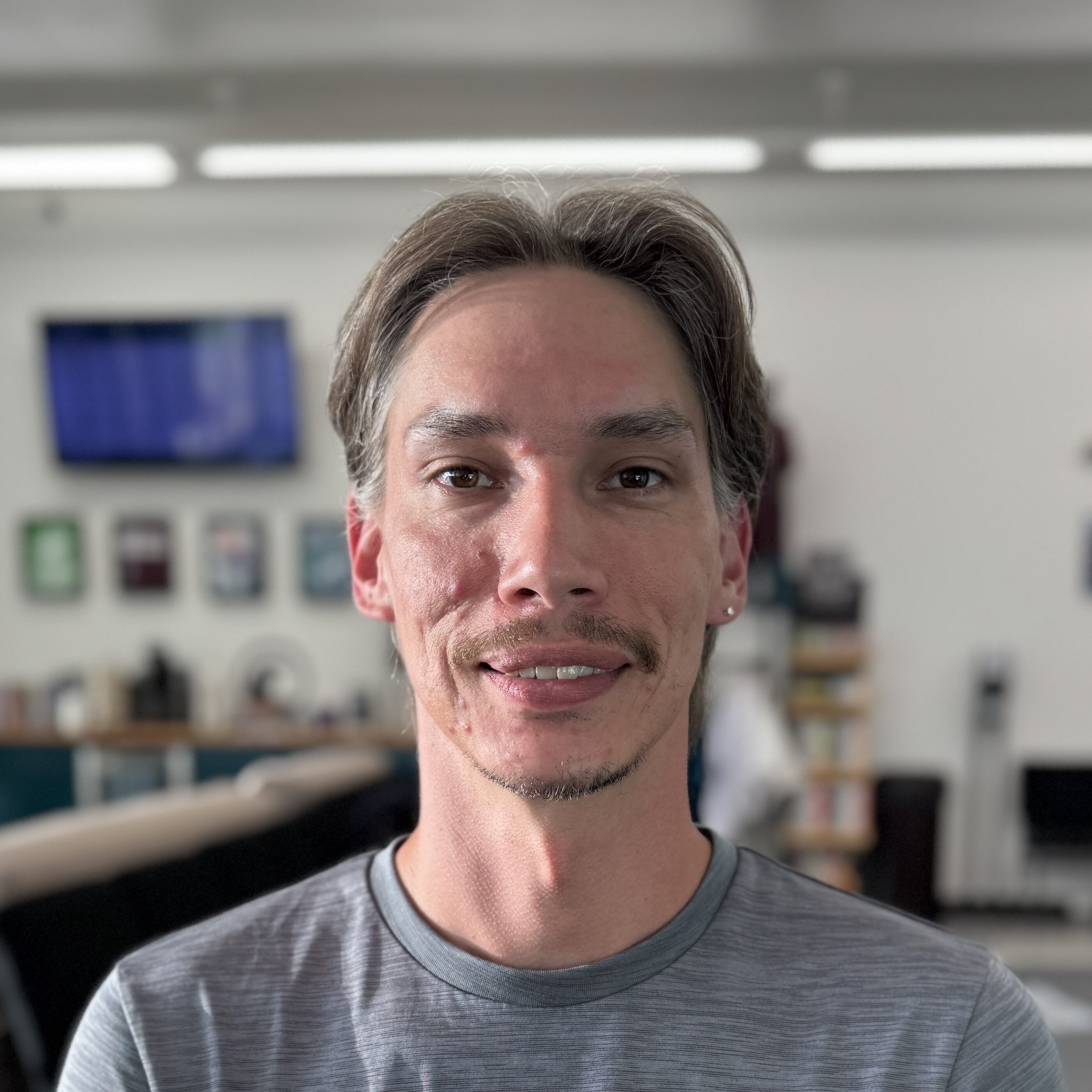In this episode of “Inside the Wave,” host Perry Wirth sits down with Tanner Brooks, a dedicated student of Jiu Jitsu and the hardworking owner of a tree cutting service. Tanner shares his journey to Jiu Jitsu, starting from spotting a Facebook ad offering a two-week free trial at Utopia, inspired in part by hearing Joe Rogan talk about the sport. With around three years of training under his belt, Tanner recounts how he initially got into working out, took a break due to life’s demands, and then found his way back to an active lifestyle through Jiu Jitsu after gaining weight. The conversation touches on the challenges of maintaining fitness with a physically demanding job and how Tanner’s commitment to Jiu Jitsu has helped him navigate the balance between work and health. Join us to hear more about Tanner’s story and how he manages to stay fit while running his demanding business.
About Tanner
Tanner Brooks is a figure of resilience and dedication, both in his professional and personal pursuits. As the owner of a tree cutting service, Tanner’s career is a testament to his hard work and entrepreneurial spirit. His journey into the arborist industry is marked by a hands-on approach and a commitment to providing quality service, which has earned him a reputation for reliability and excellence in his field. Tanner’s business is not just a job; it’s a reflection of his tenacity and his ability to tackle challenges head-on, much like the trees he skillfully brings down.
Beyond his professional life, Tanner is also known for his remarkable journey in the world of Brazilian Jiu-Jitsu (BJJ). His entry into the martial art was sparked by curiosity and a desire for a new challenge, as he sought an activity that could provide both physical exertion and mental clarity. Tanner’s approach to BJJ is deeply rooted in his philosophy of continuous learning and self-improvement. Over the course of three years, he has not only honed his skills on the mat but has also embraced the ethos of the sport—respect, humility, and the pursuit of personal growth.
Tanner’s achievements in BJJ extend beyond his own development as a practitioner. He has become a mentor and a role model within his training community, known for his willingness to support and guide newcomers to the sport. His dedication to helping others is a reflection of his belief in the transformative power of Jiu-Jitsu, not just as a form of self-defense but as a tool for building character and fostering a sense of community.
Tanner’s ethos is characterized by a balance between reason, courage, and appetite—three aspects of the soul that he believes are integral to a well-rounded life. He advocates for the importance of self-control, particularly in the context of training and injury prevention, underscoring the value of longevity in practice over short-term gains. His spiritual perspective on Jiu-Jitsu as a unifying force that transcends differences and brings people together for a common purpose further establishes his deep connection to the art.
In summary, Tanner Brooks is a man of action and introspection, whose life is a narrative of overcoming obstacles and striving for excellence. Whether he is navigating the heights of treetops or the intricacies of Jiu-Jitsu, Tanner embodies a spirit of perseverance and a commitment to living a life of virtue and purpose.
What You’ll Learn
In this episode of “Inside the Wave,” listeners will learn about Tanner Brooks’ personal journey with Brazilian Jiu-Jitsu, from his initial discovery and overcoming the nervousness of starting a new physical activity to the mental and physical benefits he has experienced. The episode covers the importance of consistency, the value of community within the sport, strategies for overcoming training plateaus, and insights into the practice and philosophy of Jiu-Jitsu. Tanner also discusses the significance of receiving feedback, the respect for belt rankings, and the influence of podcasts and educational content on his life.
Transcript
Perry: Welcome to episode three of inside the wave today. I am joined by one of my awesome students, probably one of the hardest working people I know. He literally climbed out of a tree to be here with us today. Tanner Brooks. Um, and it’s not because he’s Tarzan. It’s because he actually owns a tree cutting service. Right. So Tanner, tell me, uh, tell me about yourself. How long have you been with utopia? How long, how’d you find your way into Jiu Jitsu?
Tanner: Yeah. So I think I’ve been training with you for somewhere around three years. I’m not exactly sure, but, um, how it actually started was time flies. Yeah. Time does fly. But how it started was, um, I think I was on Facebook and I saw like, uh, coming for a two week free trial Jiu Jitsu. And I’m like, Oh, what’s that? I was flexing my marketing arm. Yeah. You’re flexing your marketing arm pretty hard. It kept on coming up. I don’t know what it was, if it was a demographic thing or whatever, you know, age. And then, I mean, obviously I heard about Jiu Jitsu a few times. Um, um, and I’ve heard like Joe Rogan talk about it a few times and stuff like that. So then, um, I was like, well, I’ll check it out because I used to work out. Right. But, um, what kind of stopped working out? And that was my, why’d you stop working out? Um, I’m not sure. So, you know, I was pretty active like in high school and then I had a break and then I got really into it for a few years. And then I think it was just work. I think it was just like… Caught up in life. Yeah, caught up in life, working. Lost as a priority. Yeah, gained 20 pounds.
Perry: I alluded to you that you climbed out of a tree. I don’t think I actually said you own a tree removal company. Your work is physically demanding. There can be a lot of hours to it, especially during tree season. Right. So it’s probably really easy to fall out of routine.
Tanner: Very easy. Especially coming home. Like, I mean, it’s dark. Like the last thing you want to do is what you want to do is take a shower and eat food and go to bed.
Perry: I’d still want you to take a shower before you train.
Tanner: Right.
Perry: And I do. So like literally I take a shower twice a night, take a shower, train, take a shower again.
Tanner: Yup. Yup. Yup. And, uh, so, so that’s what I do. But, but back to it, I mean, I, I saw that, right. And I wanted to, I don’t get into something. And I figured, um, I’ll give it a try. So I went there and I think it was, this was the Fuji days.
Perry: Okay. So this is Fuji Fuji to also teach you in the Academy a lot.
Tanner: Yeah. And then what he did is he actually sent me a video and I thought it was, I was basically nervous to come in. Right. So he sent me a video. He’s like, Hi, Tanner. You know? Oh yeah. The personalized video personalized video. And he said, I didn’t, I didn’t expect that at all. You know? And he’s like, Hey, you know, blah, blah, blah. Come in. Just make sure you bring shorts and t-shirts. So I just have basketball shorts. Right. Yeah. And I think I came in a, in a G night. How old were you when you started?
Perry: Man, I guess, you know, how old are you now? Minus
Tanner: I guess I’m 29, but I just turned 29 in February, end of February. So I had to have been at least like 25. Yeah. That would have to be my guess. So I mean, I was still young and I still had good movement in my joints.
Perry: But you definitely had a gap between like school and training. Oh, yeah. Right. You didn’t roll straight from like college or high school to be like, oh, here’s my new thing. No. So during that break between that and you were just, you started your own business, you were, you were lifting. And then what did you hear on Joe Rogan or whoever you’re listening to about Jiu Jitsu? That’s like, maybe I should try it out.
Tanner: Um, without much, I think, I think, I think what it was is basically my main pole at first was I knew that it was some sort of grappling in MMA ish. Oh, okay. I didn’t know what it really entailed, but I knew it was going to be a good workout and I wasn’t going to join a yoga class. Yeah. Right. I’m like 25. Am I going to be the only guy in a yoga class?
Perry: I don’t think so. No, but if you’re looking to meet girls, it’s probably a great spot.
Tanner: Right. Right. I guess. I mean, you could be pretty creepy too. Definitely. Yeah, you definitely don’t want to do that. So, um, so I remember just going in my first, my first night and I was terrified when I finally got there. And then I think, you know, I just got paired up with somebody and I was just in shorts and a regular t-shirt and everybody’s dressed up. It’s got their D on. I’m the only one in shorts and a regular. Yeah. I’m like, oh shit, you know? And then, and then we.
Perry: What were you nervous about? I mean, new people. Yeah, you should be nervous because most people are nervous when they come in. Almost actually everyone.
Tanner: I was nervous my first night. I didn’t know what to expect. And I think doing like a brand new thing. I also didn’t know I was going to physically go head to head with another human right away. I didn’t know that at all.
Perry: Did you research Jiu Jitsu before you came in? Like, did you go like watch videos or anything like that?
Tanner: No, no, no. I didn’t have, I didn’t have a good idea of that, but I, I knew it was wrestling. I knew the basics. I knew we were going to be choking tap. Like I knew like UFC stuff. Okay. Right. So I had a, I had an idea. Armbar. Yeah.
Perry: Rear naked choke. I knew that. Yeah. Okay. That’s it.
Tanner: You knew it on TV. Yeah. I knew, I knew it. Yeah. I knew it on TV. Yeah. I want to armbar somebody.
Perry: Okay. Sweet. And how was that first class?
Tanner: The first class, like I said, it was just terrifying. I remember the very first person that I went with was Brown Belt. He started a school. I just. Joe? No, no. Tim? No, he started a school. Dan, Jimmy, Jimmy, Jimmy, who was my very first role. Yeah.
Perry: And, and talking to me, the guy like not tattoos everywhere, but like the nicest guy in the world, this super, super nicest guy.
Tanner: And, and, and I think it was scary as shit. He’s scary. Yeah. So what I did was he was an open guard. I remember it to this day and I’m flailing around like crazy. Right. As new people do as new. Yeah. Right. I’m like, I’m like, I’m trying to get past this guy just told, Hey, just get past them.
Perry: And I’ll say like the one thing that has made you super successful outside of you just being a hardworking individual is you do not give up. Oh no. Like you just, you just go. And it’s not like you go like to try to kill me, but like you try to win and you’re not a pushover in any way whatsoever. Usually a new person, like I can just like push them over. You like, you’re like a bouncy ball. Like if I throw you at the ground, you just spring back up right away. Bounce back up, yeah. All right, so you’re going with Jimmy, you’re flailing around like a, as new people do.
Tanner: I hit somebody, my foot literally hit somebody in the head. Okay. And that person looked at Jimmy and said, you should be controlling him better. And then I got controlled better. And, and, uh, yeah, I mean, I might’ve got like, and Jimmy’s such a sweetheart. Right. So, so he told, and then he told me to go with somebody next and I got my first Leon Valley experience. Right. Really getting done to you. Yeah. Yeah. Yeah. Somebody sticking there.
Perry: So Jimmy, you let you play on top a little bit. And then the roles reverse the next one. It’s like, Hey, now you’re on bottom.
Tanner: Yeah. He, he sent me to somebody else. Basically, you know, this is a new guy control.
Perry: And it’s funny, like new people, it’s humbling. Yeah. New people can always play a little bit on top. Right? Because you just know that you want to keep the other guy down. You have gravity on your side. But you put that new person on bottom, they’re lost. Yeah, it’s bad. Right? Because you don’t know how to escape. Yeah. Outside of maybe trying to bench someone off. And that’s going to be super hard. Right. It’s terrible. You’re tired. And a few things. We hand off the new people, right? Because we want to put someone who’s not experienced and you’re in the experienced batch now. I will put any new person with you because I know that even though you could be the most dangerous person they roll with, you’re actually the safest person for them to roll with because you can tie them up so they can’t hurt themselves. Or you or flail and accidentally kick another training. Exactly. Right? So like we just do it for safety and it’s kind of, it’s to new people. It’s like, Oh my God, I have to go with the best person in the gym. I have to go with one of the brown belts, the black belts. It’s scary, but it’s actually the safest. Yeah. You’re actually more safe. You’re in better hands. And from my standpoint, The new people are sometimes the hardest people to roll with because it’s scary because you’ve been doing jiu-jitsu for a while now. If I roll with you, you’re semi-predictable because I know that you’re going to do jiu-jitsu against me and I know in general what your repertoire of techniques are and what your strategy is because you do jiu-jitsu. A new person is random. It’s a roll of the dice at what they’re going to do, but it’s like an 80-sided dice. at any point in time, they could just do a front flip onto your face. Yeah. Like you just don’t know. Yeah. Right. Yeah. They can get hurt. They can hurt you. So how were you feeling after your first class?
Tanner: I, I, man, I, I would, I, I was sweat. Like I was so sweaty. Yeah. Like as soon as my face would go down. Did you have to rest at all? There was, um, just like, no, I think, I think I kind of went through it because like, I just don’t have that off button. Yeah. I don’t have that off, but I didn’t know any better. Yeah. You know? So I was just. Obviously the people that were rolling with me were probably taking care of me and didn’t push me, pushed me just as far as I needed to go. But I just remember being so tired, so sore, so sweaty. I had regular cotton clothes on. I was just drenched. You’d like wring it out. I couldn’t believe it. Yeah. So one other memorable thing is like, Um, like, I guess I just had like a sense of clarity after, like, I remember going into the locker room and I just kind of like sat there a little bit and, and my mind was just clear. Yeah. I was clear. I wasn’t anxious about the day. Um, I wasn’t worried about business. I wasn’t worried about, um, family or anything outside of that. My mind was clear. I was just like, And so right after that, boom, right? Hey, this is our program. This is what we get. I signed up right away. Awesome. I mean, I think, I think I might’ve even like prepaid like six months.
Perry: Dude, it’s so funny because people a lot of times think like, you need to be a master at meditation. You need to meditate for months to get a clear mind and find a way to meditate and get a clear mind. And I get that when I do jiu jitsu. But you even got that when you’re doing jiu-jitsu, but you weren’t even really doing jiu-jitsu. Everyone else was doing the jiu-jitsu to you. Yeah. Right? And you still were able to finish class and be like, okay. Yeah. It’s quiet.
Tanner: Yeah. I think for me, it’s, it’s, um, Maybe like being high, strong in my mind is always racing. Like it’s even, it’s even something that I learned about myself, like being able to go to sleep at night, shutting my mind off. I have a few like techniques and things that I’ll do if I need to. Sometimes it’ll just happen. And most of the time it’ll just happens right if I go to jiu-jitsu that day. So, and so I kind of use it as a tool in that way. But I think, I think it’s just something that I needed was I needed that physical exhaustion. Yeah. Like my body needs.
Perry: And probably mental exhaustion. Mental exhaustion. Cause you’re like trying to, like, how do I survive? How do I win? How do I survive? Yeah. Right. And your mind’s going to tell your body what to do. Like, oh, this guy’s trying to kill me. Yeah. How can I stop that? How can I stop that? Right. Or slow it down.
Tanner: And it’s humbling. Talk about another thing that I realized very quickly was, boy, you might have an idea in your head of what you’re capable of. Like, Oh, if this happens, like, maybe I’m going to do, maybe I’ll do this or whatever. You know, like I was a little, I went a little bit scrappy, like high school fights type of stuff, a little scrappy. Um, decent. But as soon as you step in there and, and as soon as that first person grabs ahold of you, it’s all out the window. You’re like, Oh my gosh, like this is real. Yeah. And, and you don’t know it’s real. until you physically go and do it. You can imagine. You can look at the people like on UFC, like, why doesn’t he just get up? Yeah.
Perry: Like you let them get your arm. Easier said than done. You let them get your arm.
Tanner: How’d you get choked out there? Like their favorite person. They’re all like, what? You know, like, yeah, go to a class, try it out.
Perry: Show up. But to me, that’s like, it never goes away. No, I get manhandled. You know, I was, I think it was last year I got the opportunity to roll with Rafael Lovato Jr. You know, UFC fighter, Bellator fighter, multi-time, like one of the best American black belts in Jiu-Jitsu. When I did a private lesson with him, I’d roll with him. The only Jiu-Jitsu I did with that guy was the Jiu-Jitsu he let me do. So like I, he did all the stuff and I’ve been doing jiu-jitsu for like 16 years. And I was like, I can’t do anything to you. You’re just a monster. Like you will always get humbled. Unless you’re like you’re Gordon Ryan and you’re like literally the apex predator on the food chain. Like there’s so many different levels to jiu-jitsu and that’s what I find beautiful.
Tanner: Yeah. I mean, it’s, it doesn’t matter. There’s always going to be that guy that’s going to show you something or give you that humbling experience.
Perry: And it might even be a new person. Yeah. Oh yeah. I learned. Like you move your jiu-jitsu movement is beautiful in a way that like, to me, sometimes it feels like scrambly and random. Yeah. Like you’ll, you’ll go for risks that most people won’t take. Yeah. And I’ll learn stuff from your movement when I’m bowling with you. And I’ve been training for like 15 years longer, but I’ll still learn stuff from newer people.
Tanner: And you’ll learn if you’re watching a hundred percent, if you’re willing to learn. Yeah. And that’s the thing too, is like, Jiu Jitsu is another, another, another thing that, that gives you an idea that, Hey, you know, be willing to learn, be willing to be taught, you know, don’t give up on, you know, don’t think that, you know, at all. Yeah. You know,
Perry: And you just can’t, you’ll never know it all.
Tanner: Oh yeah. Well, as soon as, yeah, as soon as you think you do, then that’s when you stop learning. You know, it’s like, go find those, go find those teachers in life, you know, have, have mentors in life and a mentor will probably take you so far. Yeah. Right. And then it’s time for a new mentor. Yeah. And, and, you know, and like in jiu-jitsu specifically, because, I mean, this is a podcast, you know, it’s like when I first started out, it’s like, I look at you, I look at Dan, I look at Fuji and it’s all different. Like a lot of that movement that, that I’m talking about. Yeah. That’s a lot of Dan in there. Yeah. To be honest. Yeah.
Perry: Like his style of his style of training. Right. Yeah. And, and, and everyone’s execution of the art is different. Yeah. Right. Like I could teach you a rear naked choke. Right. And everyone’s going to do it a little bit. That’s true. Actually. And, you know, even though we’re talking about like depth in the sport, like a lot of people think like, Oh, you’re building up new techniques. I will learn the smallest modification to a technique I’ve been doing for a decade that will completely change the game on it for me. Yeah. Where it’s like, Hey, put your hand an inch higher for this reason. And you’re like, At first, the first time someone gives you feedback like that, you’re like, what the hell is that going to do? But then it works and you’re like, why did that happen? Why did that work? So it’s not like Datsun having more tools, but it’s sharpening those tools and learning different variations on how to use those. That’s beautiful. Now you were talking about learning a lot through watching jiu-jitsu and you came to class the other night and you’re, you did, you’re way better at me than at it. Cause if I have a key and I’m on the mat, like I’ll end up training and doing something stupid, even though if I’m injured and you put a guy on, you’re in class and you’re like, Hey Perry, I’m not training tonight. I’m just watching. Yeah. Cause you’re a little injured. Yeah. Tell me about that. That’s not something most people will do. Most people, when they take an, when they have an injury, They’re either most often, they’re just not going to come to the gym or B they’ll come and they’ll just sit on the sidelines, which is even more super rare. I would say like 98% just don’t come. 2% will come, but stay on the sidelines. And the 0.1% you in this scenario puts your D on is like, Hey, I’m just watching today and helping out.
Tanner: Yeah.
Perry: How do you get to that? That’s not something, especially with younger guys, like older guys, we’re old. We know we get hurt. Like that happens. And you know, we know to take time off, but usually younger guys are like, I’m injured. Rubbed dirt on it. You know, I’m just going to power through it. Yeah. Right. Why is your perspective different?
Tanner: I think my perspective has been a bit like it’s been, it’s been progressive. So I’ve been injured before. And I’ve, I’ve went through it. And, and, and I think the reason why I went through it is like, when you first start like tapping people, it’s fun and all this stuff. And like my idea of jiu-jitsu has changed to, I want to do it for a long time. I want to be like you. I want to be like Paul. I want to be like Dan, right. I want to do it for a long time because it is such an important thing to me. I think mentally, even spiritually in some aspects, I think it is that important. So like, I’m willing, I had to look at myself and I was training for a little bit, injured, like my back. So the injury is, you know, my back, it’s important. And it could possibly get bad. And you need that for work. Oh yeah, I need it for work too.
Perry: Most people are like, I need it for life because I teach jiu-jitsu, but I don’t need it to work at a computer all day, right? You literally just climbed the adventure to be here.
Tanner: Yeah. And my point is, I’m willing to sacrifice my desires or my appetites now and let the different part of my soul reason take over a little bit and tell me to calm down and just show up because I actually enjoy seeing the people. I mean, I’ve been knowing these people for years now every single day. It’s like family. So like, I want to come and I want to say, hi, I want to say hi to you. I want to say hi, you know, um, to other people in the gym and be a part of the community as well. And boy, it is hard not to. Yeah.
Perry: It’s hard not to roll, especially like, and you know, every time someone asks you like, Hey, you want a loan?
Tanner: You’re like, Oh no, not tonight. It’s hard. And then they’re like, are you okay? Are you okay? It’s like, yeah, I’m okay. I just, You know, I’m just gonna, I’m just going to sit out tonight. Yeah.
Perry: It’s like a little bit. Hey, like take one week off now to get your injury better. Because if it gets worse, you’re going to have to take 10 weeks off. Yeah. Right. So it’s like the, the short sacrifice for the greater victory. Right. And I think that’s a great life lesson that a lot of times it takes people a major injury for that to happen or a lot of injuries for that to happen. It’s a, it’s a really smart training approach. Yeah. Um, you said that jiu-jitsu does a lot for your, for your life spiritually. What do you mean by that?
Tanner: Um, this is like a little bit in a little bit in the wheat. I feel that. I feel that there’s three parts of our soul. Yeah. So, so we, I mean, I know. I like it. Let’s go. Okay. So, so, so you have reason. Okay. Right. You have courage and you have your appetites. Yeah. And, and reason, like the Greeks would say, like, you know, reason is here. Courage is cur of the heart and then your appetites, you know, like your stomach. Yeah. And when I brought that up, what I would say, just for this example, is going to roll and being hurt would be me feeding my appetites, right? The lowest form of good for myself and my soul. And when I am being virtuous or just, I have to listen to my reason and say, hey, no, maybe you should take some time. Maybe you should go experience, like it was deliberate, go there. Go in your gi. Go say hi to everybody. Go experience it. And do not let yourself, I’ve failed so many times of going there and trying to do that same thing. And I said, do not let yourself do it. You get suckered in. Right. So, so, so, and I, I feel that, um, like when I say, you know, spiritually, um, you know, I think that, that, you know, just on, on that small example, but, um, I think that when there’s a place where a bunch of people are coming together for a common goal, right. And, and honestly, it’s to, to be better. you know, it’s not, it’s not so much like people are coming there to want to be able to go hurt other people. It’s, it’s so much not about that. It’s just, which is so crazy. You know, at first you, I think that changes, but, um, it’s, it’s like e pluribus, e pluribus uno, right. Out of many one, like the great, you know, on the great seals, like you have a, you have a tree cutter. Yeah. You have the gym owner. You have a lawyer, right? Out of many one, just like in the United States, like you have all these people coming together. Nobody’s talking politics.
Perry: For sure.
Tanner: We’re all here for a common goal, a common purpose.
Perry: And I think a lot of times, you know, even if you are talking politics, it’s a lot of like accepting of everyone else’s views. It’s more open in that room. It’s like, it’s not a battle. Like we all have our own perspectives on, and I think it shows up in techniques. Like I, my way, I do a sweep. I have you have your way of how to do a sweep. Like neither of we know in jiu-jitsu, like neither of us are right. Like I could have my political views. You could have your political views. It doesn’t mean that we’re right. It’s just. It’s our interpretation of things. Yeah. And it’s our viewpoint on things. And like, there’s a lot of space in the middle for, and on the outsides for everyone else to sit. Yeah. And I think jiu-jitsu teaches us that.
Tanner: It teaches us that and it gives us a place to come to where we can experience the ability for multiple people in society to come together and have those conversations. And God is present in that. Yeah. Because of that. You know, like, and I, I feel, um, I feel that there. And I think like, that’s where Jiu Jitsu has changed a lot for me is like, that’s where I’ll come. I’ll come with my gi and not roll. I will drive 20 minutes. Yeah. Spend an hour and another 20, I will give two hours of my day.
Perry: to experience that. And two hours of your day to not even train and get your workout in. But you get everything else out of it, right? Because we don’t all do jiu-jitsu just for the act of doing jiu-jitsu. We do it for being with our community, being with our people. I tell people I kill so many birds with one stone when I go to jiu-jitsu class. I get to spend time with my friends. I’m, of course, running my business. I get to help other people. I get my workout in. Right? It’s so many other things. And if it’s like, hey, if I’m injured and I still go to the gym, and I get instead of five things out of it, I get four, That’s still a lot of benefit for me to do it versus me just like watching Netflix. Right. Right. And there’s no problem with taking a day off. I’m not saying like, Hey, you should go to the gym every day and you need to, you need to do this. Like take a day off every once in a while, but be deliberate about it. Yeah. Right. And especially if you’re trying to build a routine, like in your, maybe you’re a two day a week person, Tuesdays and Thursdays, like make it a habit two days a week. Cause you know, as well as I do, like once you break a habit, it’s hard to get back into it. Yeah. It’s hard to restart it. Just like you, when you said, Hey, I was working out for a while. I kind of fell out of my habit with my business and it’s hard to get back into it. Yeah. Cool. What’s the biggest change you’ve seen in your training? Right. So you started, you’ve been training for about three years. You have some pancreation sites under your belt. You have some jiu-jitsu tournaments under your belt. Yeah. You’re relatively newer blue belt, but not that much newer of one. You’ve had it for a while. What’s, what’s the biggest shift you’ve seen in your training that has helped you from like the day you walked in until today?
Tanner: My biggest shift is like, I think is mentally. I’m willing to go there and put my butt on the mat for that other new person. You know, and I was just talking about this before, honestly, we’re talking about Caleb. Yeah. And when he said to me, and I was struggling, he said, Hey, man, I got you. Got you. It’s okay. Just breathe. Right? That feeling. I’ve said that same thing to another new person. Right? With intention. Because it was a core memory. It meant something to me. And it does. So, like, my training has changed to, like, you know, when you first get that first tap, you want to go get more. I want to just armbar the shit out of somebody. Yeah, because you get that first taste of victory. Yeah. Oh, wow. And then you choke somebody out and stuff. My point is that I’m willing to go and get myself in a bad situation. I’m willing to get choked out by a white belt. I’m willing to let him take my back, feel where his choke is. It’s not always that every training or every role, it’s about me winning or just being on top or showing that I am dominant. Now, there are times when I have to switch myself out of being passive. And do jiu-jitsu for yourself. And really do some jiu-jitsu. That happens sometimes, you know, but, but I think that’s probably the biggest shift is like, no, I’m willing to let somebody work on something.
Perry: I’m willing to, cause you get to work on whatever you’re working on. If I like, Hey, white button, you can work on getting my back and choking me. That gives me the opportunity to work it out. Defenses against you. Yeah. You can always work on something. And I say this all the time, but if I help you with your goals, it inherently helps me with my own goals. It’s all about helping each other. If I just focus on me, I’m only going to get half the benefit. But if I focus on helping you, then I’m going to get double. Times that by the 30 people we have in class that night or the 10 people I roll with. Have you ran into a plateau in your training yet? Have you felt like, man, I hit a wall?
Tanner: Like, what do you mean by plateau is as interest or, or the ability to physically get a submission?
Perry: Yeah. Either like either plateauing as in, I never thought about plateauing an interest or plateauing like, Hey, you feel like you’re just not getting better at Jiu Jitsu. Have you ran into that?
Tanner: Um, honestly, so, so I guess I, I’ve never thought, I haven’t thought about it till right now. So let me, let me think through that. So interest wise, no. Um, I haven’t plateaued, uh, jiu-jitsu wise. Um, Let me, let me just ask this. What, what have I learned that’s, that’s brand new lately, or what am I working on? So, um, I’ve been trying to do a lot more arm bar stuff. Um, and, and you have an interesting thing that you showed me a while ago, and then I see you naturally go to a lot. It’s an arm bar series from having someone’s back and actually flipping your arm around their head. Yeah. So I’ve been a little bit interested in that, but I don’t think I’ve gotten any better at it, to be honest. So, so, um, I don’t have any really cool new jiu-jitsu things that I’m working out either, like reverse daily Hiva or X guard things. So in that way, maybe I have like plateaued a little bit.
Perry: Do you feel still, do you still feel like you’re improving?
Tanner: Yeah. I, I do feel like I’m improving. Awesome. Don’t think about it. Yeah. I, and I, and I don’t care about like the stripes or the battle winning.
Perry: I think that’s why you, you probably haven’t hit a plateau is because you just keep Jiu Jitsu fun. You know, you move a lot. So you’re always opening up new opportunities. Uh, you love learning. So you’re always looking for something new, like a new toy to play with. Yeah. Right. And I feel like a lot of people that run into plateaus, they run into it because, um, that they keep playing with the same toy too much. Yeah. And that toy gets boring. Oh, that’s a good point. Right? And then they don’t find something new and fun to play with. That’s a good point. And you don’t want to like just jump to new stuff and forget about the old stuff. Yeah. But like you need to keep introducing fun into your game. And I think you’ve done amazing at that. Yeah. Like there’s always smiles on your faces and you’re always like cracking jokes while rolling and stuff like that.
Tanner: And I’ll switch my game. I’ll switch my thing that I’m working on halfway through training.
Perry: Yeah.
Tanner: I’ll start going to rear naked chokes now. Okay, I’m only doing arm bars with this person. I’m only doing Kimuras with this person. Now, and a lot of times, I’ll just grab it and let it go. A lot of times I’ll just get there, grab it, like a Kimura, make sure I could have scooted my butt out. Yeah, let it go. Yeah.
Perry: Like I don’t need to, who needs that 30 seconds or reset anyway. Yeah. Right. Like take this mission, go until you might be able to tap them and move on with it. And you don’t want to do that all of the time because then you never practice the actual finish. I’ve done that. Right. Cause then you’ll get into a tournament and you’ll get a Camorra and then you just let it go for no reason. And you’re like, why’d you do that?
Tanner: Right.
Perry: Right. Awesome. Uh, how about some rapid fire questions for you? Yeah, sure. Sweet. Uh, first one. You ready? Yeah. This is challenging. Okay. Is it? Okay. Yeah. Gi or no gi? No gi. Right now. No gis? Yeah. Still? 100%.
Tanner: Okay. Uh, why? Because I feel that a lot of times when I’m rolling with people, the gi slow gets slowed down a lot and people get too focused on grips and it takes the fun out. They’re just so worried. Don’t let them pass. Yeah.
Perry: It just, I like it. It seems like it stops your jiu-jitsu. Uh, we touched on it earlier, but what are you currently working on in your jiu-jitsu game?
Tanner: Um, I I would say I would say armbar sweet um armbar from different spots Uh, it could be the armbar, but what is your favorite submission?
Perry: Like you’ll just go to your favorite one to hit kimura kimura Sweet from any certain spot or just everywhere. Um, honestly, where’s the interesting one because you can hit from
Tanner: So many different places. I always grab and threaten from half guard and then I usually get the sweep. Bottom half guard? Yeah, bottom half guard. I am terrible at that. I’ll get, I usually get the sweep from there. So I’ll try to elevate them too and sweep and then I’ll keep it and do it from the top.
Perry: Awesome. Top person you would love to train with given the opportunity. Dead or alive or in the future or whatever it might be.
Tanner: That I would love to train with? Yeah. Um, I would say I, I, I’ve never thought about that. I don’t really have, I don’t idolize that much. I, I would say, uh, any UFC fighter? Maybe Gracie.
Perry: Maybe, maybe, maybe one of the Gracies. One of the Gracies. Yeah. Cool. Um, fun side fact, uh, I went to a seminar with Hickson Gracie. Hickson, yeah. It was awesome. They’re the pioneers. Yeah, he is. He made jiu-jitsu huge. I was his uke for a technique. Really? He taught a technique on me. Dude, that guy feels like a brick. When did you do that? It was probably like a decade ago in Chicago. I went to a seminar with him. It was a really cool opportunity. You still are. Yeah. Okay. Yeah, for sure. I don’t think he does seminars anymore unless you go to I don’t know, some huge one. Maybe he does one a year, maybe one every other year. Best advice for beginners? People just getting started.
Tanner: Oh, man. Okay, Vec, just come, just show up. Relax and breathe. Don’t go with all their white belts.
Perry: Don’t do it. And as we said, all easier said than done.
Tanner: Yeah, it’s all, yeah, it’s all easier said than done.
Perry: Uh, one word to describe your Jiu Jitsu style. Um, this would be one of those ones where like we write on a sheet of paper and we show everyone at the same time and see what it says. Like, I’ll say, I’ll guess what your style is.
Tanner: So I would say, Spazzy. I would say more bouncy, flowy. I was going to say flippy.
Perry: Flippy. I would say flippy. Yeah, you are bouncy. I would say Dan is also flippy. You’re like holding on to something I can’t grasp. Yeah. I don’t know what they are, but they’re those, we used to have them as kids. You win them at the carnival, but it was like a, a tomb filled with water that rolls in on itself. When you grab it, it slips out of your hand every time. That’s what I feel like. It’s like, it’s like I’m here, then I’m over here and I’m over there and I’m cartwheeling over you. You can like teleport. Uh, the toughest aspect of BJJ to master. And this is interesting because I’m asking you a blue belt this. I, I learned a lot in three years. Like what’s the hardest thing for you to like master so far?
Tanner: My most important thing is I just want to do it for a long time. So just, just take care of your body, self-control, don’t get injured. Don’t keep on training over the injuries. It’s just, it’s just, it’s just controlling my appetites in that way.
Perry: What is one habit that has significantly improved your jiu-jitsu game?
Tanner: Um, one habit that has improved my jiu-jitsu game. Um, Don’t, I don’t, I don’t really know. I mean, just, just showing up, you, you can only get better at Jiu Jitsu by just coming, be in the room.
Perry: You can’t think it. People ask me all the time. They’re like, Hey, my goal is to get my, my blue belt. I’m like, Hey, that’s a great goal. But the goal that’s going to get you there is training.
Tanner: That’s, that’s one thing that your goal should be to train. I’m going to say, well, I’m going to say one thing about it. What bothers me so bad is the four-stripe white belt that leaves because he didn’t get his blue belt in time. Man, I don’t know because I don’t hear it. I don’t know if people ever come to you.
Perry: Oh, my blue. No, no one. So no one comes to me with that. They should, they should. Like I’m, I, I am that apparently the juice to outlier. Like if you want to know what you need to work on, you can ask me, but it better be a good question, but I’ll tell you full transparency, what you need to work on. You have to be okay with that. That might, the answer might be train more or be more consistent or don’t take a month off. Right. But I hear more of that, like, through the grapevine, like blah, blah, blah. They didn’t get a stripe. And someone will tell me that I’ll be like, they can just ask me and I’ll tell them why. Yeah. Yeah. And they’re like, does it, I get, you want it, you want that as a way to see your progress, but like whatever. By the time you get, by the time you get a black belt, you’re like, take it. I don’t want it anymore. Like take my belts away from me.
Tanner: How about, how will, yeah, yeah. How about the next time someone can put, listen, everybody just take your belt off. It all comes. Everybody’s got a white belt now. How about that?
Perry: It all comes with a, all that more stripes and more belts come with is a, is a bigger microphone, right? More people listen to you. So your work matters a little bit more, right? So a lot of responsibility comes with it, but also a huge target on your back. Okay. Like, right? You get that blue belt, people want to kill you. Right? Like, oh, this guy got his blue belt.
Tanner: I don’t know so much about blue belts. I think blue belts are kind of considered to be basically white belts that know how to tap. Know some stuff, yeah. No, just know how to tap. But, you know, it’s like, I could see that with a black belt. Yeah. Because I don’t feel like a lot of people get access to black belts.
Perry: That’s true. It’s not as bad. I feel like it was way more when I was a purple belt, like you get that purple belt, people want to like kill you. I feel like when you get your black belt, some people want to kill you, but more people just like are respectful.
Tanner: Yeah. More might even roll with you softer.
Perry: Yeah, for sure. Than somebody else. For sure. Uh, what’s one habit outside of Jiu Jitsu that’s improved your life?
Tanner: Oh, that’s improved my life. Um, I would say. I would say talking to people that have more knowledge than me, just being good student mentors. Yeah. Seeking mentors. And if you get a hold of a mentor. You ought to know how to be a good student. Otherwise you won’t. It’s a funny thing. So like if, you know, realizing, realizing what you have in front of you. So I would say the biggest thing would be mentors, older, older, older men, specifically in my life. Then that have done things maybe that I want to do or, or, or somewhere that maybe I want to be, or just emotionally more intelligent than me, you know, for sure.
Perry: Uh, last one, favorite book or podcast or source of information.
Tanner: Well, right now I listen to a lot of Philosophize This. It’s like a philosophy podcast. I’ve not listened to that one. I’ll have to check it out. Check it out. Yeah, check that out. I also listen to Joe Rogan as well. Not as much. His podcast is just so good. Yeah, they’re a long time. And, and then I do a lot of like YouTube stuff. Like what on YouTube? Um, like I’ll do educational YouTube or like fun YouTube? No, not fun YouTube. It’ll be about biblical stuff. I’m a big into like symbolism, kung, stuff like that. Just weird stuff.
Perry: Yeah. It’s that it’s only weird. I should make it weird. It’s like jiu-jitsu. Yeah. Outside person looking in on Jiu Jitsu, you’re like, it’s pretty weird when you’re doing Jiu Jitsu. It’s only weird if you make it weird. Yeah. Cool. Uh, anything else you would like to share today with our listeners, people getting interested in Jiu Jitsu, people starting out Jiu Jitsu, any final last words.
Tanner: To all the parents that bring their kids to Jiu Jitsu, it was really scary, right? For your kid to join Jiu Jitsu, step on the mat one time. Ooh. Step on the mat one time. Just one time. It’s like, I don’t think jiu-jitsu is just for everybody. Yeah. Like you need to step on the mat one time.
Perry: Experience it. Try it out. Yeah. Awesome. Well, I appreciate you, man. Thank you so much for climbing out of a tree, giving up part of your work day to come here and join us on Inside the Wave podcast. If you guys listen, you guys like this, give us a five-star review or whatever your podcast platform is. Like it, share it, and we love you. Thank you, guys.






















